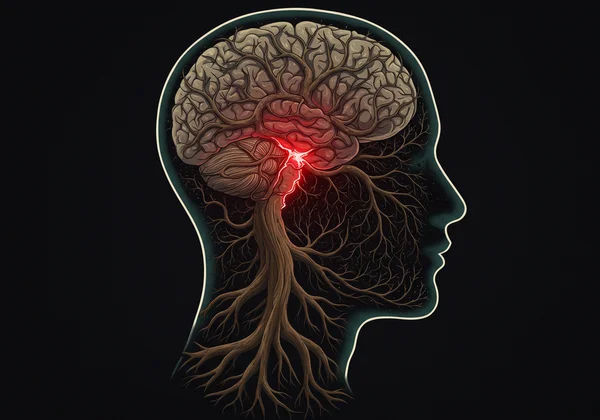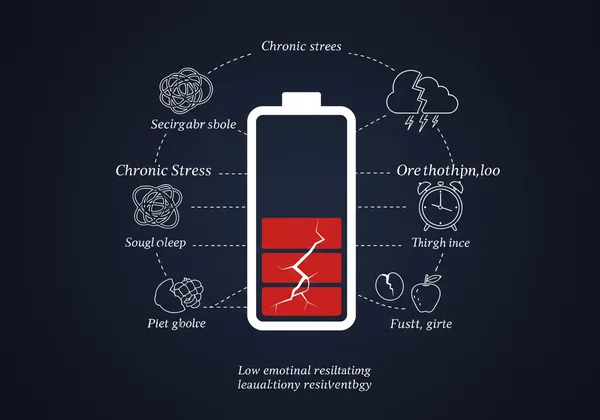Why Am I So Angry? Take Our Free Anger Test to Understand Chronic Anger Causes
July 27, 2025 | By Landon Brooks
Feeling like you're on a short fuse all the time can be exhausting and isolating. If you constantly find yourself asking, why am I so angry?, you're not alone. This feeling of persistent or chronic anger often runs deeper than a single bad day or a frustrating event. It's frequently a signal from your mind and body that there are underlying issues that need attention. Understanding the root causes is the first crucial step toward regaining control and finding peace.
This guide will help you explore the complex factors that contribute to chronic anger. From past experiences to daily habits, we'll uncover the hidden drivers behind your emotions. Gaining this clarity is a powerful act of self-discovery. When you're ready to see how these factors apply to you personally, a great starting point is to take our free anger test for personalized insights.

Unpacking the Psychological Roots of Persistent Anger
Often, the source of ongoing anger lies within our minds and personal histories. These psychological roots can create a default emotional response that leans heavily toward frustration and irritability. Understanding these internal patterns is essential for changing them.
How Past Experiences Shape Your Anger Patterns
Our brains are wired to learn from experience, and that includes emotional responses. If you grew up in an environment where anger was a common way to express frustration or resolve conflict, you may have learned to do the same. Unresolved trauma, whether from significant events or a series of smaller painful experiences, can also keep the body's threat-response system on high alert, making anger more accessible than other emotions.
These past events create what psychologists call "schemas" or mental frameworks. When a new situation resembles a past negative experience, your brain can automatically trigger the old, learned anger response. It's a protective mechanism that has become overactive. Identifying these triggers is a key part of understanding your unique anger patterns. An anger assessment test can help illuminate these learned responses.

The Link Between Anger and Mental Health Conditions
Chronic anger is often a symptom, not the core problem. It can be closely linked to other mental health conditions that influence mood and emotional regulation. For example, individuals with depression may experience irritability and anger instead of, or in addition to, sadness. The frustration of feeling helpless or hopeless can easily manifest as rage.
Similarly, anxiety disorders can contribute to anger. Constant worry and fear create a state of high tension, making a person more likely to snap in response to minor stressors. Conditions like ADHD or PTSD also have strong connections to difficulties with anger control. Recognizing that your anger might be part of a bigger picture is vital for finding the right path toward management and healing.
Physiological Factors & Lifestyle Influences on Your Anger
Your mind and body are deeply connected. What's happening on a biological level and the choices you make every day can significantly impact your emotional state and contribute to underlying anger issues.
Brain Chemistry and Hormonal Imbalances
Your brain's neurotransmitters, like serotonin and dopamine, play a huge role in regulating your mood. When these chemicals are out of balance, it can be much harder to manage emotions, including anger. For instance, low levels of serotonin are commonly associated with increased impulsivity and aggression.
Hormonal fluctuations can also be a major factor. Imbalances in hormones like testosterone, cortisol (the "stress hormone"), and thyroid hormones can directly affect your mood and make you more prone to irritability. While you can't always control these biological processes, being aware of them helps you understand that your anger isn't just a character flaw. This self-knowledge is the foundation for effective anger management.
Stress, Sleep, and Diet: Everyday Fuel for Anger
Think of your emotional resilience as a battery. Chronic stress, poor sleep, and an unhealthy diet can drain that battery, leaving you with little energy to cope with daily frustrations. When you're sleep-deprived, the prefrontal cortex—the part of your brain responsible for impulse control—doesn't function optimally. This makes it much easier to react angrily without thinking.
Likewise, a diet high in processed foods and sugar can cause blood sugar spikes and crashes, leading to mood swings and irritability. Chronic stress floods your body with cortisol, keeping you in a constant state of "fight or flight." Addressing these lifestyle factors is one of the most practical ways to start managing anger. To see how your lifestyle might be affecting you, take a comprehensive anger test to start your self-discovery journey.

Learned Behaviors and Environmental Contributors to Anger
We don't exist in a vacuum. Our environment and the behaviors we witness and learn from others play a significant role in how we express and experience anger.
Observing Anger in Family & Social Circles
Behavior is often learned through observation, especially during childhood. If you saw parents, family members, or peers use anger to get what they want, intimidate others, or express any form of discontent, you may have internalized that this is a normal or effective way to behave. This learned behavior becomes an automatic response in your own life.
Breaking this cycle requires conscious effort and self-awareness. It starts with recognizing that the way you learned to handle frustration might not be serving you well now. You have the power to unlearn these patterns and develop healthier communication and coping strategies. Understanding where the behavior comes from is the first step in that process.
External Stressors: Work, Relationships, and Life Events
Sometimes, persistent anger is a direct response to a persistently stressful environment. A high-pressure job, a toxic relationship, financial instability, or ongoing family conflict can create a state of chronic frustration. When you feel powerless to change your circumstances, that helplessness can curdle into anger.
This type of anger is a signal that something in your life needs to change. It's your emotional system telling you that your boundaries are being crossed or your needs are not being met. While you may not be able to eliminate all external stressors, identifying them allows you to develop strategies to mitigate their impact. A clear picture from an online anger test can help you pinpoint which areas of your life are contributing the most to your anger.

Taking the First Step Towards Understanding and Managing Your Anger
Grasping the roots of your anger—whether they are psychological, physiological, or environmental—is the most important step you can take toward change. It moves you from a place of confusion and self-blame to a position of knowledge and empowerment. You're no longer just reacting; you're beginning to discern why you're reacting.
This journey of self-awareness doesn't have to be overwhelming. A simple, scientifically-backed tool can provide you with a personalized map of your anger. Our platform offers a free, multidimensional anger test designed to help you explore your anger's frequency, intensity, triggers, and expression. Get your results to gain the clarity needed to build a healthier, more peaceful life.
Frequently Asked Questions About Chronic Anger
Do I really have chronic anger issues?
If you feel angry or irritable more often than not, if your anger feels intense and out of proportion to the situation, or if it's negatively impacting your relationships, work, or health, you may be dealing with chronic anger. It's less about a formal diagnosis and more about how anger affects your quality of life. Answering the question "how to know if I have anger problems?" often starts with self-reflection, and taking an anger issues test can be an incredibly insightful tool.
Can an online anger test diagnose me?
No, an online anger test cannot provide a medical diagnosis. Our tool is designed for self-exploration and educational purposes only. It provides valuable insights into your emotional patterns and potential triggers based on established psychological models. However, it is not a substitute for a professional evaluation from a doctor or licensed mental health provider. Think of it as a helpful first step with an anger test on your journey.
What are the common signs of underlying anger problems?
Common signs include frequent irritability, sarcasm, bottling up emotions until you explode, physical symptoms like a racing heart or tense muscles, and relationship conflicts. You might also find yourself engaging in passive-aggressive behavior or feeling a constant sense of frustration. Recognizing these signs is crucial for seeking understanding and support.
How can an anger test help me understand my anger better?
A well-designed anger test can break down a complex emotion into understandable components. Our multidimensional test, for instance, assesses not just if you're angry, but how you're angry. It explores your triggers, the intensity of your reactions, and your style of expressing anger. This provides a detailed snapshot, helping you connect the dots between the causes discussed in this article and your own personal experience, giving you a clear starting point for change.